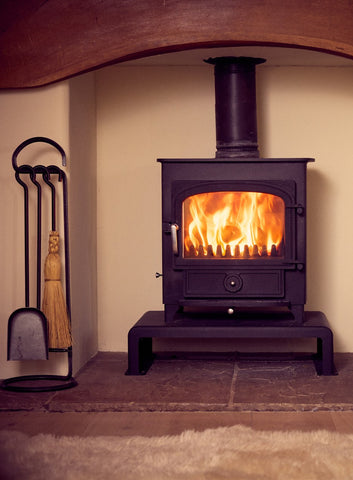What Is The Best Wood For My Log Burner?
It's that time of year again; the days are gradually getting shorter, the nights longer, and the mornings filled with frozen dew. Especially on weekends, there is no better feeling than cosying up around your wood burning stove, wrapping yourself up in your favourite blanket and watching those dancing flames of a fire inside your woodburner.
Now we're all spending more time around the fire, it's important that we inform ourselves on the dos and don'ts of wood burners.
In this blog, we talk about stove-friendly woodfuels and discuss why it is important to choose the correct firewood to burn in your home. Choosing the type of firewood for your log burner can heavily impact not only the heat output but also the number of pollutants it emits, along with the duration of your fire.

What is the best type of wood for indoor burning?
Whilst yes, collecting logs from your back garden or local woodland may seem like a more cost effective option, when it comes wood burning stoves, choosing high-quality, dry logs will prove to be of better value in the long run.
Unseasoned logs are not good for wood burners. Not only are they nearly impossible to light but they don't give out nearly as much heat as logs dried below 20% moisture because most of the energy is used to burn off the water content rather than producing heat. Burning wet wood will also release more smoke and creosote, which will in time blacken and damage your appliance.
Kiln dried logs are your safest bet. Kiln drying is just a much faster version of natural air drying, which can take anything from 18 months to 3 years compared to what 40-50 hours of Certainly Wood kilning can achieve. Kiln dried logs will burn better, burn hotter, release less smoke and are better for the environment compared to wet logs.
Should I burn hardwood or softwood in my log burner?
Whilst there is no issue with using softwood logs on your appliance, the logs are far less dense than hardwood logs. As a consequence, you will need about twice the amount of softwood kiln dried logs to provide the same amount of energy as hardwood kiln dried logs. Hardwoods will also produce a high to moderate heat output for a longer period. In our bulk bags, you will receive a mix of ony hardwood species, primarily oak, beech and ash.
Why is buying the right firewood so important for your log burner?

There are a few reasons why you should pay close thought to the type of firewood you burn on your log burner. One is the stove's performance. For you to get the most heat with minimal smoke out of your firewood, it has to be dried properly.
Another reason why you should be burning properly seasoned or kiln dried wood is for fire safety. When burning wet wood, your chimney will begin to build up deposits of creosote and if enough creosote accumulates, the performance of your stove will be at risk but you will also be a lot more susceptible to chimney fires.
Talking about chimneys, if you buy properly seasoned or kiln dried logs you won't have to spend as much money on a chimney sweep and other stove maintenance or repairs, so the 'saving' you make from purchasing unseasoned logs, will in time be offset by higher chimney maintenance costs.
The last mentionable reason to purchase kiln dried wood instead of wet wood is because of the new legislation DEFRA introduced back in May 2021, the Ready to Burn Scheme. HETAS and Woodsure were appointed to run this certification scheme, which would make it easier for consumers to find the cleanest woodfuels because only firewood reliably under 20% moisture content would be labelled with the certification mark.
What size logs should I buy?
The above is a very common question we get asked here at Certainly Wood. This question is a very personable one and will always come down to one thing; the appliance.
We offer 3 different size logs, these being the 25, 35 and 50cm cut logs. The most popular size to go for are the 25cm logs (9 3/4 inches) as these fit 99% of the UK wood burners. This would always be your safest bet when shopping with us however if you're looking for a bigger log, keep reading.
We would recommend our 35cm or 50cm logs if your log burner can take them. These logs are longer in length, which means that they would have a longer burn time.
Our chunky logs are what they say on the tin - very chunky. These logs are the same quality and species as our standard kiln dried logs but a lot wider in diameter (10-20cm). These logs are recommended for large woodburners and open fires.
If the 25cm are still too large for your woodburner and you own a Hobbit stove or something similar that requires logs no longer than 20cm, then you should consider Dinkies - small logs for small stoves.

Comments